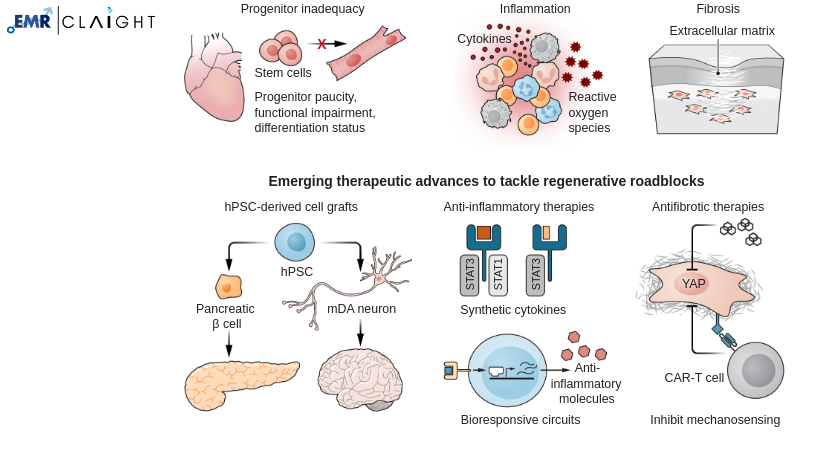
The regenerative medicine market is witnessing significant growth due to the rising investment in research and development by leading biotechnology and pharmaceutical companies. Regenerative medicine aims to restore, replace, or regenerate damaged tissues and organs using innovative approaches, including stem cell therapy, gene therapy, and tissue engineering. Increasing cases of chronic diseases, advancements in medical technology, and rising demand for personalized medicine have contributed to market expansion. Governments and private organizations are also investing in regenerative medicine research, further fueling industry growth.
Regenerative Medicine Market Size
The global regenerative medicine market was valued at USD 4.36 million in 2024 and is projected to grow at a CAGR of 11.70% during the forecast period from 2025 to 2034. This growth is primarily driven by technological advancements in cell and gene therapy, increased regulatory approvals, and expanding applications of regenerative therapies in treating chronic diseases, orthopedic conditions, and cardiovascular disorders. The market is expected to reach significant milestones in the coming years as new therapies gain approval and commercialization expands.
Regenerative Medicine Market Share
North America currently dominates the regenerative medicine market, holding the largest market share due to the presence of key players, advanced healthcare infrastructure, and substantial funding for R&D initiatives. Europe follows closely, with a strong focus on stem cell research and government support for innovative medical treatments. The Asia-Pacific region is witnessing rapid growth due to increasing healthcare expenditures, rising patient awareness, and expanding clinical trials. Other regions, including Latin America and the Middle East & Africa, are gradually adopting regenerative medicine as regulatory frameworks evolve.
Regenerative Medicine Market Trends
-
Expansion of Stem Cell Therapies – Increasing adoption of stem cell-based treatments for chronic diseases and regenerative applications.
-
Advancements in Gene Therapy – Growth in gene-editing technologies and their integration into regenerative medicine.
-
3D Bioprinting Innovations – Development of bioengineered tissues and organs for transplantation.
-
Personalized Medicine Growth – Tailored regenerative treatments based on patient genetics and biomarkers.
-
Strategic Collaborations – Increased partnerships between biotech firms and research institutions to drive innovation.
Regenerative Medicine Market Analysis
The regenerative medicine market is undergoing rapid transformation with increased investments, regulatory support, and groundbreaking scientific discoveries. The demand for regenerative therapies is rising due to their potential to treat previously untreatable conditions such as neurodegenerative disorders, cardiovascular diseases, and musculoskeletal injuries. Market players are focusing on expanding their research pipelines, obtaining regulatory approvals, and commercializing innovative therapies. Despite these positive developments, the industry faces challenges, including high costs of treatment, complex regulatory pathways, and ethical concerns surrounding stem cell research.
Regenerative Medicine Market Segmentation
By Product Type
-
-
Cell Therapy
-
Gene Therapy
-
Tissue Engineering
-
Small Molecule and Biologic Therapies
-
By Application
-
-
Orthopedic and Musculoskeletal Disorders
-
Cardiovascular Diseases
-
Oncology
-
Neurology
-
Wound Care
-
Others
-
By End-User
-
-
Hospitals & Clinics
-
Research Institutes
-
Biopharmaceutical Companies
-
Specialty Centers
-
By Region
-
-
North America
-
Europe
-
Asia-Pacific
-
Latin America
-
Middle East & Africa
-
Get a Free Sample Report with Table of Contents
Regenerative Medicine Market Growth
The regenerative medicine market is poised for substantial growth over the next decade, driven by continuous advancements in biotechnology and increasing patient demand for innovative treatments. With governments providing funding and regulatory agencies streamlining approval processes, the commercialization of regenerative therapies is expected to accelerate. Market expansion is also fueled by the growing aging population, rising prevalence of chronic diseases, and the increasing acceptance of cell and gene therapy in mainstream healthcare.
Recent Developments and Challenges in the Regenerative Medicine Market
Recent Developments:
-
Increased FDA and EMA approvals for gene and cell therapy products.
-
Expansion of clinical trials for regenerative therapies targeting rare diseases.
-
Collaborations between pharmaceutical companies and research institutions to advance regenerative medicine applications.
-
Advancements in bioprinting technology for tissue regeneration.
Challenges:
-
High costs associated with regenerative treatments and therapies.
-
Complex and lengthy regulatory approval processes.
-
Ethical and legal concerns related to stem cell research.
-
Limited patient awareness and accessibility in developing regions.
Key Players in the Regenerative Medicine Market
-
Novartis AG – A global leader in gene therapy and regenerative medicine research.
-
Vericel Corporation – Specializes in developing advanced cell therapy products.
-
Stryker Corporation – Focuses on regenerative solutions for orthopedic conditions.
-
Integra LifeSciences Corporation – Innovates in tissue regeneration and wound care solutions.
-
Mimedx Group Inc. – Develops placental-based regenerative therapies.
-
Wright Medical Group N.V. – Engages in regenerative orthopedic solutions.
-
Others – Various emerging biotech firms contributing to regenerative medicine advancements.




Leave a Reply